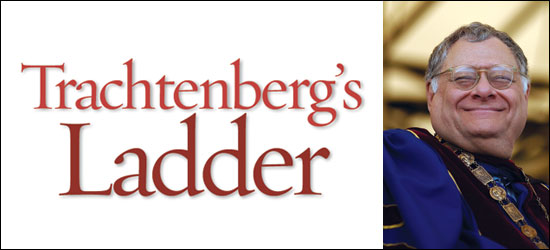
Julie
Woodford
The president's leadership inspires others
to new heights
by Jamie L. Freedman
Early in his career, GW President
Stephen Joel Trachtenberg was visiting the office
of a fellow lawyer when his eyes were drawn to
a chart on the wall depicting a ladder. Upon closer
scrutiny, he was impressed to see that the ladder
illustrated the attorney’s rise to admission
before the U.S. Supreme Court—linking his
ascent all the way back to Daniel Webster. “I
thought, ‘What a great thing to be part
of such a long and distinguished professional
chain,’” Trachtenberg reflects.
 As
he prepares to “step up” to teaching
after nearly 20 years at GW’s helm, Trachtenberg
has built an impressive ladder of his own. Some
15 deans and vice presidents that he mentored
over the years are now university presidents themselves,
and the list continues to grow. All are quick
to credit him with propelling their rise to the
top. Never forgetting his own roots, Trachtenberg
keeps in close touch with his two surviving mentors—John
Silber, former president of Boston University,
and John Brademas, former president of New York
University—who remain integral rungs on
Trachtenberg’s ladder. As
he prepares to “step up” to teaching
after nearly 20 years at GW’s helm, Trachtenberg
has built an impressive ladder of his own. Some
15 deans and vice presidents that he mentored
over the years are now university presidents themselves,
and the list continues to grow. All are quick
to credit him with propelling their rise to the
top. Never forgetting his own roots, Trachtenberg
keeps in close touch with his two surviving mentors—John
Silber, former president of Boston University,
and John Brademas, former president of New York
University—who remain integral rungs on
Trachtenberg’s ladder.
Mentoring comes naturally to Trachtenberg, whose
tenure in higher education, and life, is epitomized
by close relationships. “Like teachers,
one of the obligations of university presidents
is to encourage others to fulfill their professional
potential as thoroughly as possible,” Trachtenberg
says. “I have been blessed over the years
to work with a terrific assortment of people with
extraordinary strengths, vision, and ambition,
and have tried to create opportunities for them
to serve the academy at the highest levels.”
Trachtenberg’s academic dynasty spans the
nation, with his protégés going
on to lead universities like Kent State, University
of Utah, California State at Monterey Bay, and
Yeshiva University. He stays in touch with them
all, exchanging frequent e-mails and phone calls.
“Keeping in touch with people is an obsession
of mine,” says Trachtenberg, who still communicates
with a dozen of his high school classmates.
“As a mentor, Steve Trachtenberg is really
involved in your life as a person who truly cares
and helps you just for the pleasure and altruistic
value of doing so,” says Jonathan Rosenbaum,
president of Gratz College in Philadelphia, who
worked with him at the University of Hartford.
“In a very rushed world, he’s always
there, willing to share his time, advice, and
brilliantly incisive mind. I still don’t
know how he did it, but long before e-mail, I
would write to him on a Monday and by Wednesday
there would be a personal response.”

|
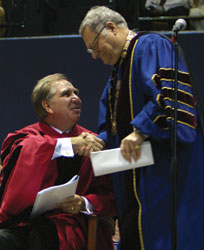
Former GW Law School
Dean Mike Young says Trachtenberg consistently
and generously took the time to talk with
him about the challenges of running an institution
of higher learning. Young has been the president
of the University of Utah since 2004.
Abdul El-Tayef/WPPI.com
|
Trachtenberg’s many associates—both
at GW and the University of Hartford, where he
served as president for 11 years—widely
regard him as a stand-out mentor. “He was
absolutely a major influence on me becoming a
university president,” says Walter M. Bortz
III, who became president of Hampden-Sydney College
in Virginia in 2000 after serving as a vice president
to Trachtenberg at both GW and Hartford. “He’s
a patient man and, above all, a great teacher
who is willing to take the time to explain his
position on any issue to the people who work closely
with him.”
That sentiment is echoed by Mike Young, president
of the University of Utah since 2004, who served
as dean of GW Law School for six years under Trachtenberg.
“Steve Trachtenberg definitely planted the
seed for me to become a university president,”
Young says. “I didn’t come to GW with
any ambition of becoming a president, but my interactions
with Steve Trachtenberg gave me the sense that
this is a job where one can really make a difference,
and, if you enjoy what you are doing, the chance
of painting on a slightly larger canvas is an
exciting thought.”
Young says that Trachtenberg was “remarkably
generous” with his time. “I would
schedule brief meetings with him to discuss issues
that needed resolution, and we’d routinely
wind up talking for an hour and a half, using
free association to address the problem from a
variety of different perspectives,” he explains.
“In the process, we touched upon many things—ranging
from how to run a university to what’s at
stake, and I learned an enormous amount. It was
a very valuable time for me.”
Peggy Stock, past president of Colby Sawyer College
in New Hampshire and Westminster College in Salt
Lake City, spent 10 hours a day training with
Trachtenberg as an American College on Education
fellow at the University of Hartford in 1979.
“Steve Trachtenberg certainly was career-wise
the most important person in my life,” says
Stock, who went on to serve as his senior vice
president for administration at Hartford for seven
years.
“He taught me how to be a good, successful
college president. Steve is smart, creative, straightforward,
and funny, and taught me how to take appropriate
risks, how to turn a college around, how to hire
and fire, how to work a room, and not to be afraid
to tell people when you’ve made a mistake.
I loved working with him. I used to say it was
like being married. Eighty percent of the time
it was great, but 20 percent of the time I wanted
to kill him.” One thing’s for sure,
Stock notes. “I grew tremendously during
my tenure with him. He’s made a real difference
in my life.”
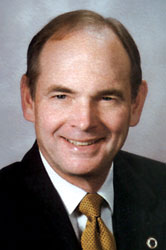
Walter Roettger, president of Lyon College
in Batesville, Ark..
|

|
Trachtenberg’s inimitable style sets him
apart both as a university president and as a
mentor, says Walter Roettger, president of Lyon
College in Batesville, Ark., who worked with him
at Hartford. “There’s no question
about it. Stephen Trachtenberg is one of a kind,”
he states. “He’s an inspirational
guy with an extraordinary breadth of knowledge
and wisdom, as well as an unusual ability to identify
opportunities and pursue them in a way that I’ve
rarely seen in people. He taught me to take opportunities
as they come, to pay attention to and connect
with people, to be my own person, to separate
the wheat from the chaff, and to bring all these
things together in a meaningful way in the best
profession there is. He may be the best advocate
and best critic in higher education.”
While quick to admit that he’s a demanding
boss and certainly not a saint, Trachtenberg’s
protégés all speak enthusiastically
about the president’s passion for his work,
vision, boundless energy, and humor. “Many
of us have tried to borrow that vitality, sense
of humor, and that enormously positive attitude
that he has,” says Roettger, who’s
now in his ninth year as head of Lyon. “He
taught me that this is an institution that stretches
across time and space, and that anything is possible.”
Rosenbaum says that he’s never had a conversation
with Trachtenberg when they didn’t laugh.
“Steve always has things in perspective,
thanks to that magnificent, witty humor he uses
to such great effect,” he states. “He
makes you realize that even the most seemingly
impossible task is achievable. His invariably
original and incisive analysis, capacity to presage
the future, gift for dreaming and then transforming
those dreams into reality, and unrivaled wit are
the hallmarks of a great leader. He’s the
model university president for many of us.”

|
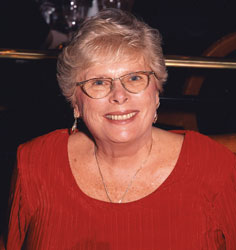
Peggy Stock, past
president of Colby Sawyer College and Westminster
College.
|
Trachtenberg’s associates quickly learn
that they can’t match his energy level.
“I learned early in the game not to try
to keep up with him, and I’m an extremely
energetic person,” states Stock, who is
known in some circles as the “female Stephen
Joel Trachtenberg.”
“Steve taught me that a good university
president works 24 hours a day and is the greatest
cheerleader of the institution,” Bortz says.
“You must have a tireless spirit and do
whatever it takes to get things done. He’s
a master at motivating people and has the ability
to zero in on any issue, pare it down to its two
or three most important kernels, and then move
on those areas. He often said that one plus one
equals three. That’s what we were always
trying to accomplish.”
Young lauds Trachtenberg’s ability to “think
outside the box,” as well as the fact that
he does not micromanage. “I really appreciated
the fact that Steve gave me a lot of room to do
my job,” he says. “He let me take
charge of the Law School, and that’s a terrific
training ground for almost anything, because your
successes are your own and your mistakes are your
own.”
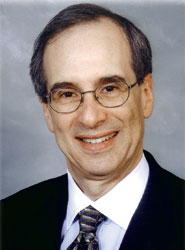
Jonathan Rosenbaum, president of Gratz College
in Philadelphia, say Trachtenberg’s
influence was integral in their careers.
|

|
It’s no surprise that many people who work
closely with Trachtenberg develop a genuine affection
for him, Rosenbaum says. “He’s a person
who listens, which is extraordinarily important,
and he’s a people person,” he states.
“There’s nothing artificial about
Steve Trachtenberg. He has the ability to be self-deprecating
but at the same time fully aware of his dreams
and how to realize them. I believe he’s
the most visionary leader in American higher education
today.”
Did Trachtenberg ever dream he’d leave
such a far-reaching professional legacy? “Absolutely
not,” he answers, attributing his successful
track record to the talents and strengths of his
colleagues. While he admits to investing some
of himself in the many rising leaders who worked
with him over the years, he says that their achievements
are their own. “To be a good mentor, you
have to be prepared to unselfishly celebrate the
accomplishments of others and encourage them,
even as you realize that they are smarter and
more talented than you are, and also better looking
and a better dancer.” On a more serious
note, he adds, “They all have strong personalities
and outstanding abilities of their own, and much
of what I have accomplished is the result of their
support.”
As Trachtenberg sees it, mentoring is an integral
part of university life. “Universities are
promise factories—they help people make
the most of their promise,” he says. Selflessness
often comes into play. “While many of my
associates themselves had the ambition to become
university presidents, I planted the seed in others,
insisting that they go on and get a doctorate
or apply for an opportunity that I’d heard
about, even though it was against my best interests,”
he states. “I didn’t want them to
leave, but I knew if I didn’t help and encourage
them in this way and point out the direction,
I would never forgive myself.”
“Mentoring is sort of like midwifery,”
Trachtenberg explains. “You’re helping
somebody give birth to who they are going to become
and your job as a trustee in a sense is to nurture
them and encourage them and make them see how
they can fully develop, and then you’re
supposed to get out of their way and watch them
fly!”
It can be quite a balancing act, Trachtenberg
admits. “You need to be honest,” he
says. “Some people have too much humility
about what they can do and some people have too
little—some underestimate what they can
do and others overestimate. You don’t want
your associates to miss their highest potential,
but you don’t want them to fly too high,
like Icarus, and then crash into the sea and drown
when their wings melt from flying too near the
sun.”
As humbled as he is that so many of his key administrators
have gone on to lead universities of their own,
Trachtenberg confides that the biggest surprise
of all is that he spent three decades of his life
as a university president. “The truth is
I never thought I myself would get to be a university
president, and I’m still astonished,”
he remarks. “I think all sensible people
have someplace in their psyche a seed of self-doubt,
and they think that one day the door is going
to come crashing open and somebody is going to
say to them, ‘Get out from behind that big
desk, you fraud.’ And I figure anybody who
doesn’t have that fear or that concern,
however fleeting, at some point in their lives,
probably is in denial.”

|
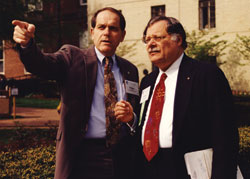
Walter M. Bortz III,
a vice president to Trachtenberg at both
GW and Hartford, has been president of Hampden-Sydney
College in Virginia since 2000.
|
One thing’s for sure. It’s been the
journey of a lifetime. “I’ve had a
terrific time!” Trachtenberg enthuses. “In
addition to being a privilege, it’s been
a lot of fun. Universities are joyful places doing
joyous things in which you’re surrounded
by young, healthy, beautiful people at the most
luminescent moments of their lives and by colleagues
who, more than most people I think in society,
like their work. I’m always puzzled by people
who come away from university presidencies saying
that they’re exhausted or tired or disillusioned,
because I feel like whatever the struggle might
be, ultimately the university recharges your battery
all over again.”
His colleagues say it’s been an incredible
ride for them as well. “Steve Trachtenberg
has set a new standard for leaders of higher education,”
Rosenbaum says.
“All of us need heroes, especially in a
time where we tend to disparage the very concept.
Steve is a person who, through his humility, is
heroic and through his vision accomplished, is
a hero. He has taken fine institutions and made
them even greater by every standard. He has protégés
and grand-protégés of exceptional
quality and commitment at universities all over
the country, and they all have great affection
for him. He’s a phenomenal leader who will
have an impact on generations to come.”
Recipe for a Successful University President
What does it take
to make a great university president? Stephen
Joel Trachtenberg shares his secrets—complete
with optimal ingredients for success, proven
“tricks of the trade,” and choice
words of wisdom.
• You have to be reasonably bright
and articulate, a little courageous, and
a little visionary.
• You have to love higher education,
universities, youngsters, reading, ideas,
and scholarship.
• You have to think that education
is one of the more important things in life
and you have to be prepared to take a certain
amount of abuse, albeit with encouragement
and hugs and love, as well, in order to
accomplish your goal.
• You have to be prepared to be a
servant of the institution and its stakeholders
without becoming slavish.
• You have to do for people what
they need done, which is not always the
same as what they think they want.
• You have to believe in yourself,
but not so much that you don’t believe
in others.
• You have to laugh a lot.
• You have to have a sense of humor
and a sense of the ridiculous in life.
• You have to be childlike without
being childish, taking delight in issues
both big and small.
• It’s very helpful to have
good friends, colleagues, and a spouse who,
when you come home dejected, will mix you
a good martini and tell you that you’re
wonderful and not to pay any attention to
your critics.
• Always strive to make your remarks
prudent, sound, and positive.
• You have to make every effort to
be presidential without becoming parve—neither
meat nor dairy. It’s important that
you do stand for things, that you retain
a capacity to be offended, to be hurt. You
have to stay in touch with your humanity
and not allow yourself to become too insulated
because criticism and the taking seriously
of negative observations is what helps to
sharpen your ability to serve and to get
it right or better the next time.
• I’ve often thought that developing
a thick skin is not necessarily a good thing;
it’s good to have a thin skin, but
not necessarily react every time somebody
gives you a poke.
• After you’ve said, “Off
with their head,” you can’t
say, “On with their head!” It
sounds like something straight out of Alice
and Wonderland, but being temperate as much
as you can obviously is a good thing.
• When people come to see you about
things, whatever it is they think they’re
talking about, they’re really talking
about money. They might tell you that the
gymnasium needs a new floor or that we need
more student counselors in a school, but
what they’re talking about is money,
and there’s a great reluctance to
recognize that because talking about money
is considered commercial and vulgar. How
much more preferable it is to talk about
goals and visions and ambitions, but, in
the end, all of those goals and ambitions
and visions have to be paid for with money,
and because the university president worries
about the money, he liberates his colleagues
to think higher thoughts.
• Being a university president is
a calling. You don’t get offered a
job; you get called to a campus.
• A university president is an artist
as well as a teacher, because crafting a
university is a work of art.
• It says in the book of Luke “to
those who much is given, much will be expected.”
University presidents are somewhat indulged.
You get to live in the big house. But, there’s
a reason for that and it doesn’t come
free. It incurs personal and professional
obligation.
• Learning to turn the other cheek
is vital. It makes you stronger and it surprises
your critics. Nietzsche once said, “Anything
that doesn’t kill me makes me stronger.”
If that’s true, I must be Atlas or
Hercules or Sampson! |
|